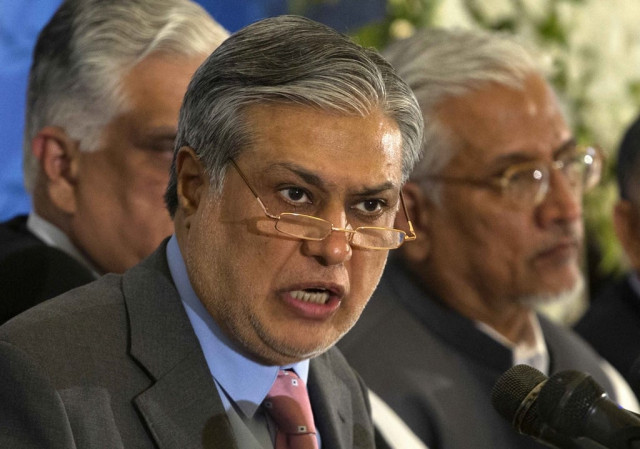Reforms missing: Govt considering unrealistic tax target for next year
Expects Rs3.2t revenue collection; FBR insists on something below Rs3.1t .

PHOTO: REUTERS
Without tackling growing corruption and overhauling the inefficient tax system, the government is considering setting Rs3.2-trillion tax target for the next fiscal year, which experts say cannot be achieved until drastic reforms are introduced.
Finance Minister Ishaq Dar wants the Federal Board of Revenue (FBR) to collect that much amount in 2015-16 beginning July aimed at saving the International Monetary Fund’s (IMF) loan programme, say sources in the Ministry of Finance.
In order to achieve the goal, he has asked the FBR to prepare a plan to impose over Rs200 billion in additional taxes from the new fiscal year.

The government is planning to set an unrealistic tax target keeping in view the fact that it has already revised downward the outgoing year’s target of Rs2.810 trillion to Rs2.691 trillion. Even the revised figure could not be touched as the FBR had told the finance minister that annual collection may remain around Rs2.6 trillion, said sources.
Against the base of Rs2.6 trillion, the FBR will require 23% growth in revenues that independent experts say cannot be achieved with the present tax structure. For the outgoing fiscal year, the FBR was tasked with collecting Rs2.810 trillion, a 24% increase over previous year.
However, even after introducing four mini-budgets to generate an additional Rs100 billion in taxes and withholding Rs220 billion worth of taxpayer refunds, the FBR received only Rs1.766 trillion in the first nine months of the current year, recording only 12.2% growth, according to FBR’s documents.
An unrealistic target will not only expose taxpayers to the risk of mini-budgets, but it will also put in jeopardy the provincial budgets that are based on the FBR’s tax revenues.
The next year’s tax target was discussed during a meeting chaired by the finance minister at the weekend. According to sources, FBR Chairman Tariq Bajwa did not endorse the Rs3.2 trillion target as he reportedly insisted on a figure that was below Rs3.1 trillion.
However, looking at the previous instance, there is a possibility that the government will again not listen to the FBR chief and suggest a figure that will be in line with the IMF’s condition of restricting the budget deficit to around 4% of gross domestic product next year.
Sources in the FBR said like this year, any target above Rs3.1 trillion would not be the FBR’s goal. For the outgoing year, the revenue board had proposed Rs2.7 trillion tax target, which neither the finance minister nor the IMF endorsed.
A decision on revenue collection will be taken during talks with the IMF from May 2 in Dubai.
“By keeping in mind the expected collection of Rs2.6 trillion this year, the next target should not be more than Rs3 trillion,” suggested Masoud Naqvi, Chairman of government-constituted Tax Reforms Commission. “The FBR cannot achieve more than 15% growth in revenues next year,” he said.
According to Naqvi, a lot should be done to reform the FBR and in this regard the tax commission will present its report to the government next week.
In April last year, the government had constituted the Tax Reforms Commission aimed at suggesting measures to overhaul the existing system, which has outlived its life.
In a clear sign of corruption and inefficiency in the FBR, the effective sales tax rate is only 4.825% against the standard tax rate of 17%, highlighting leakages due to corruption and tax exemption granted to the affluent.
Sources pointed to the two tax rackets in Karachi with alleged backing of some members of the FBR. Last week, Karachi Chamber of Commerce and Industry President Iftikhar Ahmed Vohra also spoke about the corrupt practices during a meeting of a parliamentary committee.
Published in The Express Tribune, April 28th, 2015.
Like Business on Facebook, follow @TribuneBiz on Twitter to stay informed and join in the conversation.


















COMMENTS
Comments are moderated and generally will be posted if they are on-topic and not abusive.
For more information, please see our Comments FAQ